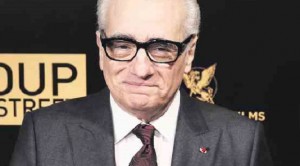LOS ANGELES—There’s still enough sex in “The Wolf of Wall Street” even though director Martin Scorsese had to trim some footage in order to avoid an NC-17 rating in the US, which would have substantially limited the audience for the film that portrays the sex-and-drugs excess of Wall Street in the late ’80s.
Based on the book of the same title by Jordan Belfort (a Long Island penny stockbroker—played by Leonardo DiCaprio—who spent 20 months in prison for refusing to cooperate with authorities in a securities fraud investigation), “The Wolf…” features bacchanalian mise-en-scene. But, as the master filmmaker himself said, those sex scenes in the office or houses are intentionally not sexually titillating.
Martin’s latest opus also stars Matthew McConaughey (brilliant, even in a short role), Jonah Hill, Margot Robbie, Cristin Milioti, Kyle Chandler and Jon Favreau.
The director said that he’s mulling a DVD version that runs four hours and 10 minutes, which was the length of his first cut. The cut shown to us clocked in at two hours and 59 minutes. Excerpts of our interview:
What scenes did you have to give up to get an R rating and avoid NC-17?
I was asked to trim a little more—the sex scenes, basically. It was problematic, but there wasn’t anything I was forced to take out or I felt uncomfortable taking out of the picture. Ultimately, maybe it was also an accumulation of all the sexuality and drugs. So, we tempered some of them, but nothing to the point where I was displeased.
How novel an experience was it for you to direct some of the “crazy” sex scenes? Leonardo DiCaprio said that those scenes reminded him of “Caligula.”
The sexual images and all of that—I didn’t want any repression of it. I wanted the freedom to be able to have people who would do what we need, and we were able to get that. Adam Somner, my assistant director, helped a great deal. Another person helped choreograph a lot of it.
We wanted to keep a sense of humor about it—the framing and all the choreography. Yes, none of my other films ever had this blatant sexuality, but the thing about it was that it wasn’t about making something that was sexually stimulating. It’s a kind of obscenity that reflects the obscene mentality of bad business.
Leonardo also said that he would come to you with ideas and you would try them. Were there ideas that were too much for the film?
We were aware that we were going to make something that had to push the limits, to be excessive but enjoyably excessive. In other words, not boring. It had to work on an excessive level. If they came up with an idea that was even more excessive, I would have tried it.
Some of the things wound up being used—in terms of excess or reactions—whether it’s throwing lobsters at the FBI agent (played by Kyle Chandler). We tried it, and kept it in.
Was there a different code of ethics in Wall Street in the late ’80s and early ’90s?
In the guise of legality or the pursuit of opportunity, more damage seems to be done, and less seems to be done about it. This mentality is extremely encouraged and validated by our culture. So, that’s even more dangerous!
This movie brings stylistic parallels to your classics like “Goodfellas” and “Casino.” Do you agree?
I guess you could say on the surface that “Wolf” has stylistic similarities with “Goodfellas” and “Casino.” But, what I tried to do, in this case, was to create the world that they’re in, and place the audience within that world—not judging, almost as if the audience is going along for a ride. Things are becoming more absurd and funnier. You get caught up in that humor, lifestyle and energy, because you begin to realize that it’s funny but it’s not funny.
So, yes, I used all the styles I’ve used in the past—and hopefully some new ones (laughs).
E-mail rvnepales_5585@yahoo.com. Follow him at https://twitter.com/nepalesruben.
